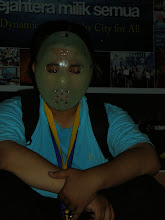30 May 2001 will be remembered in Malaysian history as a day when the people's long suppressed hopes for justice were rekindled by a learned, honest and courageous judge whose refusal to accept the Internal Security Act (ISA) struck at the very heart of repressive law and oppressive rule in this country.
On 30 May 2001, Justice Dato' Mohd Hishamuddin Mohd Yunus, in the Shah Alam High Court, ruled that the detention of two Parti Keadilan Nasional leaders, N Gobalakrishnan and Abdul Ghani Haroon, under ISA was unlawful. Justice Mohd Hishamuddin ordered the Police to release them immediately.
In making his ruling, Justice Mohd Hishamuddin added that the detentions had been carried out in bad faith, violated the detainees' constitutional rights, and ignored their procedural rights.
Justice Mohd Hishamuddin also ordered the Police not to re-arrest Gobalakrishnan and Abdul Ghani for at least twenty-four hours. This was an unprecedented order given past Police practice of immediately re-arresting the rare ISA victim who was freed by the Courts.
Justice Mohd Hishamuddin even told Parliament that `it is high time' to reconsider the relevance of ISA so as to prevent and minimize abuses of law by the authorities.
The Malaysian people will see in Justice Mohd Hishamuddin's ruling the beginning of the end to an unfortunate tradition of judicial reluctance to challenge the use of draconian legislation and brutal force by a regime that has increasingly set aside the rule of law.
Together with all Malaysians who are concerned with Justice, Freedom and the Rule of Law in this country, Aliran salutes both Judge and Judgment for this historic defence of the Constitution, civil liberties and human rights.
Until the full written judgment is available, Aliran reproduces, below, excerpts from the oral judgment delivered by Justice Mohd Hishamuddin to permit Malaysian citizens to appreciate some of the legal and political issues involved.
On why the further incarceration of the detainees was in breach of the Constitution: `The affidavits by the respondents are vague in nature and inadequate. The grounds for arrest must be clearly stated in the affidavit and it cannot simply parrot the provisions in the Constitution. There must be some reasonable amount of particulars (on the grounds of arrest) to be fair to the detainee who believes he is innocent.'
On how the Police ignored procedures:`The Inspector General of Police and director of Special Branch have prematurely made up their minds to detain them for the 30 days well beyond that stated in the ISA. The IGP and director of SB have ignored procedural rights.'
On the Police's denial of visits by families or legal counsel: `Not allowing access to one another is cruel, inhuman and oppressive, not only to the detainees but also to their family members. What harm would the visits of the family members bring? The visits can be closely monitored. This court does not understand such reasoning. It is a blatant and gross violation of the detainees' constitutional rights. It is unlawful to deny them (their rights).'
On habeas corpus: `There were no affidavits filed by applicants because for 40 days they were denied access to their lawyers. If applicants truly believe that they were framed and their detention was unjust, it is their right to file habeas corpus as guaranteed under Section 5(2) (of the Constitution).'
Aliran calls upon all Malaysians concerned with Justice, Freedom and the Rule of Law to take inspiration from Justice Mohd Hishamuddin's ruling to continue the struggle to protect civil liberties and human rights – and particularly to erase the dark shadow of ISA upon our society.
------------------------------------------------------------------------------
On 10-11 April 2001, just days before public protests planned to mark the second anniversary of the sentencing of former Deputy Prime Minister Anwar Ibrahim, the authorities detained seven opposition leaders under the ISA, then three other people in the following days. Most of the ten, who were all held incommunicado until May 4, were members of Keadilan. The authorities alleged that they were plotting to overthrow the government but produced no evidence to substantiate this.
On May 30, in an unusual and courageous ruling, Judge Hishamuddin Yunus ordered the release of two ISA detainees on a writ of habeas corpus, and suggested that Parliament should review and either scrap or amend the ISA to reduce its potential for abuse. By mid-November, authorities had released three more detainees, but five had been served with two-year detention orders and were being held at the Kamunting Detention Centre. The six are: Tian Chua, Ezam Mohamed Noor, Badrul Amin Bahron, Hishammuddin Rais, Saari Sungib, and Lokman Nor Adam.
-------------------------------------------------------------------------
1996 was to prove a busy year for Lingam, as lawyer or litigant in a number of notable court cases. About the same time, Lingam represented Berjaya group tycoon Tan in a defamation suit against veteran journalist MGG Pillai which the High Court found in Tan’s favour and awarded RM10 million in damages - a record sum. Pillai’s appeal to the Federal Court was heard by a three-member panel led by Eusoff, who upheld the finding but reduced the quantum of damages to RM2 million.
Still in 1996, Lingam filed three defamation suits for a total of RM190 million against lawyers, journalists and several others over an article in the International Commercial Litigation (ICL) magazine. The article ‘Malaysian Justice on Trial’ published in the November issue of the British-based magazine had suggested that Lingam and Tan had connections with judges, namely in the controversial Ayer Molek case and Tan’s suit against Pillai.
It was only last year that High Court judge Hishamudin Yunus dismissed the suit filed against the magazine and said it was Lingam’s wrongful conduct in the Ayer Molek case that had led to the publication of the article. Hishamudin said Lingam was guilty of “abusing and manipulating the process of court” in filing the action in the appellate and special powers division of the High Court instead of the commercial division.
-----------------------------------------------------------------------------
Justice Hishamudin, who holds a Bachelor's degree and a Master's of Law from the prestigious London School of Economics and Political Science, caused a stir in his 28-page judgment when he said it was high time that Parliament examined the relevance of the ISA which was originally meant to counter terrorism. He called for a review of the ISA and its provisions to prevent or minimise abuses.
While lawyers applauded him, this, however, did not go down well with the Government. Datuk Rais Yatim, who was then a minister in the Prime Minister’s Department, said it was not up to a judge to decide which laws should be amended. But the Asean Law Association was quoted as saying that judges could comment on the relevance of laws and had a duty to inform Parliament when a law became outdated or was inappropriate.
The Negri Sembilan-born Hishamudin, who became a High Court judge in October 1995, has also presided over other interesting political cases. In August 2005, he awarded RM4.5mil to Anwar in his libel suit against Datuk Abdul Khalid @ Khalid Jafri Bakar Shah, the author of 50 Dalil Mengapa Anwar tidak boleh jadi PM (50 reasons why Anwar cannot be PM). Explaining the decision to award such a large figure, Hishamudin said the facts and circumstances of the case were unique and hence, the damages awarded must be reflective of the peculiarity of the case.
In another case heard in August 2005, where Anwar had sued the Government, the Home Minister and the then IGP Tan Sri Rahim Noor over the assault and infamous black eye incident while he (Anwar) was detained and held under police custody in September 1998, Hishamudin presided over the case. He struck out the suit when all parties came to an out-of-court settlement in which the sacked deputy prime minister was paid an undisclosed amount, and Rahim made an open court apology to Anwar for the assault.
Another riveting political case Hishamudin heard involved former Malacca Chief Minister Tan Sri Rahim Tamby Chik who sued Parti Keadilan Nasional (now Parti Keadilan Rakyat) former information chief Ruslan Kassim RM15mil for slander. But Justice Hishamudin again did not have to rule on the case because in January 2004, he announced that the two parties had agreed to settle the case out of court and Ruslan made an open court apology to Rahim for damaging his reputation.
He also heard a case that gripped the nation in October 2000 where express bus driver Hanafi Mat Hassan was accused of raping and murdering computer engineer Noor Suzaily Mukhtar, a passenger in the bus. Suzaily sustained 44 injuries and fractured a neck bone. She died from strangulation. Justice Hishamudin found Hanafi guilty and sent him to the gallows.
Last year, Justice Hishamudin also made a decision which sparked fresh debate when he ruled on the controversial Ayer Molek case. He ruled that the Federal Court panel that heard the case involving a dispute of shares was illegal and unconstitutional because only two of three judges – former Chief Justice Tun Mohamed Eusoff Chin and Datuk Dr Zakaria Mohamed Yatim – were competent to sit at the apex court.
He said the third judge, Datuk Pajan Singh, should not have heard the case because he was only a High Court judge back then. As such, he said, he was not bound by the Federal Court decision of that case handed down 11 years ago and chose to follow the Court of Appeal ruling instead.



































No comments:
Post a Comment